8 ways to show your at-risk LGBT teenager you love them
Large study shows LGBT teens have double the suicide risk

An earlier version of this article appeared on News Break.
The nation’s first large study assessing teen suicide risk by gender and self-identifying sexuality shows gay, lesbian, and bisexual children have more than double the risk compared to their heterosexual peers.
The report in the Journal of the American Medical Association analyzed data from the 2015 National Youth Behavior Survey. About 50,000 youths nationwide completed the survey.
Among gay male teens, 25.5 percent had considered suicide as opposed to 10 percent of heterosexual males.
Across the board, girls, straight or gay, were even more likely to consider suicide. A staggering 40 percent of lesbian teens had considered taking their own lives, as opposed to 20 percent of heterosexual teen girls.
Bisexual teens also were at greater risk for suicide, even after adjusting for confounders.
“This study is limited by the lack of data for suicide risks among transgender adolescents and a 60 percent response rate that may limit generalizability,” the team of researchers explained. “Further study is also needed to understand the mechanisms underlying elevated suicide risk behaviors for sexual minority adolescents.”
Gay teens need more mental health resources
They concluded the letter with a call to action.
“The substantial suicide risks among sexual minorities merits a comprehensive reaction,” they explained. “Policymakers should invest in research to understand and prevent suicide among sexual minorities.
"Clinicians should discuss sexual orientation with patients and allocate appropriate mental health resources. Caretakers should watch for signs of suicide risk behaviors.”
Even more concerning is the research published in JAMA leaves out transgender youths altogether. Transgender teens long have been believed to be most vulnerable to suicide from being shoved to the margins of our society.
It’s a revelation that shows these children may even be more vulnerable than their staunchest allies feared.
The timing of the study coincided with another bizarre development in the U.S. medical community.
The U.S. Centers for Disease Control and Prevention (CDC), which is supposed to be a non-partisan government agency charged with protecting our nation’s public health, planned to change its vernacular.
‘Transgender’ prohibited from documents
The Washington Post reported the Trump administration was prohibiting officials at the Centers for Disease Control and Prevention from using a list of seven terms, including "transgender" and "diversity" in official documents being prepared for (2019) budget.
Trump’s pick for the director of the CDC has come under controversy before. In the 1980s and 1990s Robert Redfield worked at Walter Reed Army Hospital. He advocated for quarantining people with HIV, according to an article in Mother Jones.
He also did not respect the soldiers’ confidentiality, the story reported. News of servicemen having HIV would rise through the ranks.
Ignoring science and sexuality has the potential to create a public health crisis. If you have a teenager who is gay, lesbian, bisexual or transgender, let them know you love them.
Here are eight ways to show your love and support for your gay teen.
1. Don’t ask them about their sexuality. Ask them about their friendships. Make sure they have healthy relationships with people who support them.
2. Don’t discuss the “gay issue” with your son or daughter unless they bring it up. Many teens these days would rather keep their sexuality to themselves for a while. Don’t force an uncomfortable conversation.
3. If your son or daughter brings home a same-sex date, pretend the date is of the opposite sex if you must. Don’t act awkwardly in front of your child’s special friend. Be polite and friendly.
Try to find out what your son or daughter has in common with their new relationship. Talk about things you all have in common.
4. Learn the glossary of LGBT terms. Make sure you know the difference between transgender and cross-dressing, for example. If you don’t, your son or daughter may think you are too ignorant to understand them, too
5. ‘Lead with Love,” PFLAG recommends. This can be tough if your political or spiritual views around sexuality cloud your thinking.
“As best as you can, however, remember this: No matter how easy or difficult learning about your child’s sexual orientation or gender identity is for you, it probably was difficult for them to come out to you,” PFLAG explains.
“And, while saying “I love you” is one obvious way to express your love for your child, if you find yourself at a loss for words, as many of us do sometimes, a hug can speak volumes.
6. Show subtle support.
“Whether it’s speaking positively about an LGBTQ person you know, or a character from a movie or television show; reflecting out loud about gender or sexuality issues surfacing in the news; or openly reading and sharing new learning about gender or sexual diversity, these small hints let kids know that you are supportive and understanding,” PFLAG explains.
7. Ask questions. The Advocate, the national gay and lesbian newsmagazine, says that’s only natural of a parent.
“Ask them if there are particular things they want you to know or understand (like what a particular term means to them, personally), or if there are books they want you to read or shows they want you to watch,” the Advocate recommends.
8. Don’t ignore your child’s revelation, even if you don’t like it at first.
“For many parents, this can be a difficult brain-shift,” The Advocate admits. “Perhaps no one in your immediate circle quite understands what you are going through. You might also feel guilty for not being able to immediately accept your child’s identity. We get it.
“However, don’t let those feelings create an environment where you avoid the topic entirely. Forgive yourself for having conflicting feelings, sure, but don’t let those immediate concerns overshadow the fact that your kid just told you about a very important part of themselves.”
About the Creator
David Heitz
I am a journalist with more than 30 years' experience. Here at Vocal, I write mainly for Potent, Vocal's cannabis magazine. I have a PTSD diagnosis and a medical cannabis card. I have lived in a penthouse and also experienced homelessness.






Comments
There are no comments for this story
Be the first to respond and start the conversation.